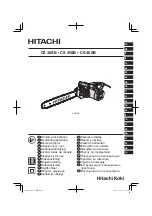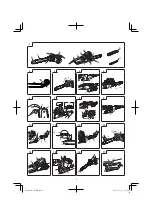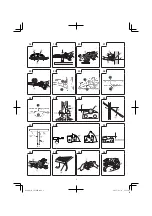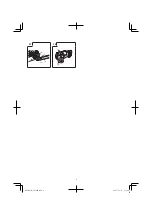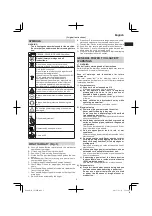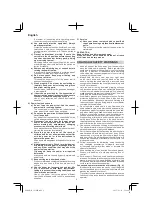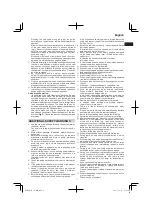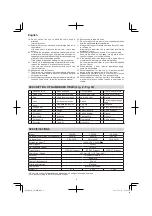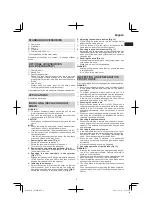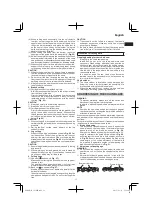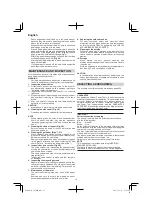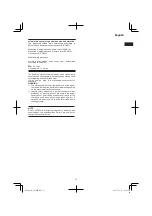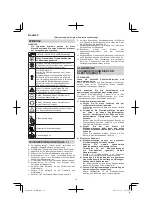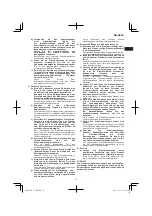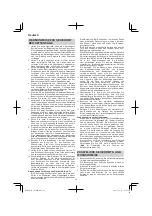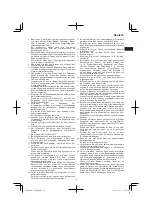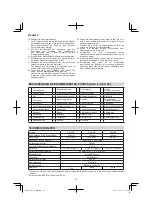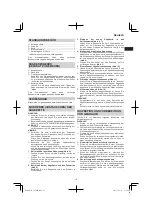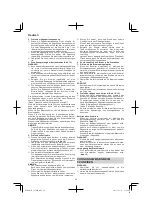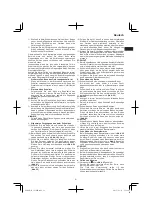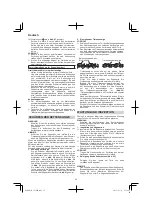
7
English
Pinching the saw chain along the top of the guide
bar may push the guide bar rapidly back towards the
operator.
Either of these reactions may cause you to lose control
of the saw which could result in serious personal
injury. Do not rely exclusively upon the safety devices
built into your saw. As a chain saw user, you should
take several steps to keep your cutting jobs free from
accident or injury.
Kickback is the result of tool misuse and/or incorrect
operating procedures or conditions and can be avoided
by taking proper precautions as given below:
○
Maintain a
fi
rm grip, with thumbs and
fi
ngers encircling
the chain saw handles, with both hands on the saw
and position your body and arm to allow you to resist
kickback forces. Kickback forces can be controlled by
the operator, if proper precautions are taken. Do not let
go of the chain saw.
○
Do not overreach and do not cut above shoulder
height. This helps prevent unintended tip contact and
enables better control of the chain saw in unexpected
situations.
○
Only use replacement bars and chains speci
fi
ed by the
manufacturer. Incorrect replacement bars and chains
may cause chain breakage and/or kickback.
○
Follow the manufacturer’s sharpening and maintenance
instructions for the saw chain. Decreasing the depth
gauge height can lead to increased kickback.
Chain brake operation:
If a chain saw hits a solid object at a high speed it reacts
violently and kicks back. This is di
ffi
cult to control and
could be dangerous, especially with lightweight tools
that tend to be used in all kind of positions. The chain
brake immediately stops the chain from rotating if there
is an unexpected kickback. The chain brake can be
activated by pressing your hand against the handguard
or automatically by the kickback itself.
The chain brake can only be reset after the motor
has stopped completely. Reset the handle to the rear
position (
Fig. 3
). Check the function of the chain brake
every day.
ADDITIONAL SAFETY WARNINGS
1. Use the electrical voltage listed on the name plate for
the power source.
The use of a voltage that exceeds this may result in
injury.
2. Work without pressure. In addition, always keep your
body warm.
3. Before commencing work, re
fl
ect fully on the work
procedures involved and work to avoid accidents,
otherwise injury may occur.
4. Do not use in the event of bad weather, such as strong
wind, rain, snow, fog, or in areas prone to rockfall or
avalanches.
In bad weather, judgment may be impaired and the
vibration may result in disaster.
5. When visibility is poor, such as during bad weather or
night, do not use the unit. In addition, do not use it in
rain or in a location exposed to rain.
Unstable foothold or loss of balance may result in an
accident.
6. Check the guide bar and saw chain before starting the
unit.
○
If the guide bar or saw chain is cracked, or the product
is scratched or bent, do not use the unit.
○
Check if the guide bar and saw chain are securely
installed. If the guide bar or saw chain is broken or
dislodged, this may result in an accident.
7. Before starting work, check to ensure the switch does
not engage unless the lock-o
ff
button is pressed.
If the unit does not working properly, immediately stop
using and request repair from your Hitachi Authorized
Service Center.
8. Install the saw chain properly, in accordance with the
instruction manual.
If installed incorrectly, the saw chain will come o
ff
the
guide bar and injury may occur.
9. Never remove any of the safety devices equipped
on the chain saw (brake lever, lock-o
ff
button, chain
catcher etc.).
In addition, do not alter or immobilize them.
Injury may occur.
10. In the following cases, switch the unit o
ff
and ensure
the saw chain is no longer moving:
○
When not in use or being repaired.
○
When shifting to a new work location.
○
When inspecting, adjusting or replacing the saw chain,
guide bar, chain case and any other part.
○
When re
fi
lling the chain oil.
○
When removing dust etc. from the body.
○
When removing obstacles, trash or sawdust generated
from work from the work area.
○
When you take o
ff
the unit, or when you get away from
the unit.
○
Otherwise, if you sense danger or anticipate risk.
If the saw chain is still moving, an accident may occur.
11. Work should generally be performed individually.
When multiple individuals are involved, ensure
su
ffi
cient spacing between them.
In particular, when felling standing trees or working on
a slope, if you anticipate trees falling, rolling or sliding,
ensure there is no danger to other workers.
12. Remain more than 15 m away from other people.
In addition, when working with multiple persons,
remain 15 m or more apart.
○
There is a risk of impact with scatters and other
accidents.
○
Prepare a whistle alert etc. and determine appropriate
contact method for other workers beforehand.
13. Before felling standing trees, ensure the following:
○
Determine a safe evacuation location prior to felling.
○
Remove obstacles (e.g., branches, shrubs) in advance.
○
Based on a comprehensive evaluation of the state
of the tree to be felled (e.g., trunk bend, tension of
branches) and the surrounding situation (e.g., state of
adjacent trees, presence of obstacles, terrain, wind),
decide on the direction in which the standing tree will
fall and then plan the felling procedure.
Careless felling may result in injury.
14. When felling standing trees, ensure the following:
○
During work, be very careful of the direction in which
trees fall.
○
When working on a slope, ensuring the tree will not roll,
always work from the uphill side of the terrain.
○
When the tree starts falling, switch the unit o
ff
, alert
the surroundings, and immediately retreat to a safe
location.
○
During work, if the saw chain or guide bar become
entangled in the tree, switch o
ff
and use a wedge.
15. During use, if the unit performance deteriorates, or you
notice any abnormal sound or vibration, immediately
switch o
ff
and discontinue use, and return to your
Hitachi Authorized Service Center for inspection or
repair.
If you continue using, injury may occur.
16. If the unit is accidentally dropped or exposed to impact,
inspect carefully for damage or cracks and ensure
there is no deformation.
If the unit is damaged, cracked or deformed, injury may
occur.
17. When transporting the unit by car, secure the unit to
prevent it moving.
There is a risk of accident.
0000Book̲CS30SB.indb 7
0000Book̲CS30SB.indb 7
2015/03/13 17:18:44
2015/03/13 17:18:44
Summary of Contents for CS 30 SB
Page 236: ...236 0000Book CS30SB indb 236 0000Book CS30SB indb 236 2015 03 13 17 18 58 2015 03 13 17 18 58 ...
Page 240: ...240 0000Book CS30SB indb 240 0000Book CS30SB indb 240 2015 03 13 17 18 59 2015 03 13 17 18 59 ...
Page 241: ...241 0000Book CS30SB indb 241 0000Book CS30SB indb 241 2015 03 13 17 18 59 2015 03 13 17 18 59 ...

